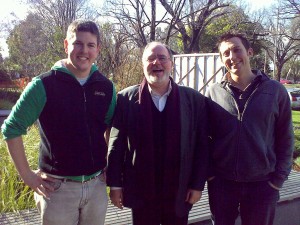 I was in Melbourne recently and caught up with two outstanding young Tasmanian theologians who are taking Ridley College by storm: our very own Chris and Luke. They are seen here bringing ‘The Bish’ up to date with the latest theological insights and catching up re goings on back in Tasmania. We had a good yarn over lunch: they claim it’s their only meal of the semester! – Well, they didn’t this time 😉
I was in Melbourne recently and caught up with two outstanding young Tasmanian theologians who are taking Ridley College by storm: our very own Chris and Luke. They are seen here bringing ‘The Bish’ up to date with the latest theological insights and catching up re goings on back in Tasmania. We had a good yarn over lunch: they claim it’s their only meal of the semester! – Well, they didn’t this time 😉
I asked them about my blogging and their tips included:
- Issues, contemporary
- Book reviews
- Photos – occasional/people and places
- Future of Anglican Church, National and International
- Guest blogging
- Bishop’s timetable, events, schedules

- Bible & Devotional reflections
- Top 5: eg, Movies; Stalls at Taste of Tasmania;
- Worst 5: eg, things in ministry; Strangest 5: eg, things in ministry
What is helpful about a blogging bishop?
- Makes the Bishop available
- Is communicating the Bishop’s views
- Is a reference point
A stimulating time. Thanks, guys! I hope I’ve understood you rightly. If not, let me know 🙂


